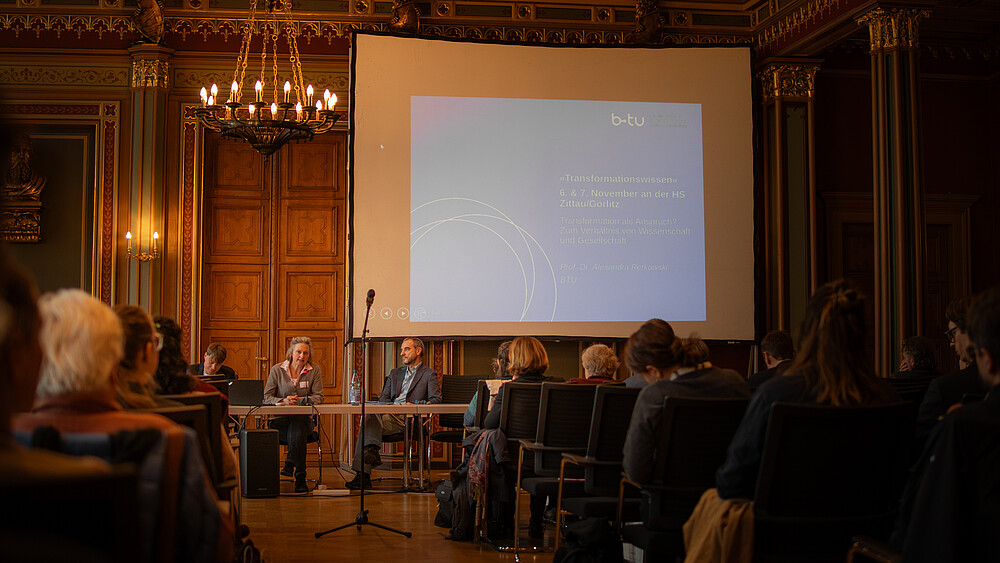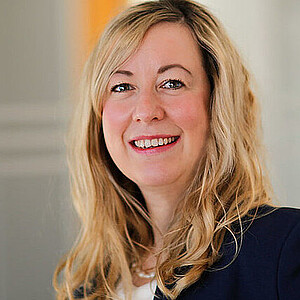TRAWOS Institute encourages discussion on transformation processes in structural change with conference "Transformation knowledge as a problem area of social change: theory and regional practice".

On November 6 and 7, 2025, the TRAWOS Institute (Institute for Transformation, Housing and Social Spatial Development) of the Zittau/Görlitz University of Applied Sciences, together with a broad alliance of scientific and regional institutions, organized the conference "Transformation knowledge as a problem area of social change: theory and regional practice" - in Zittau Town Hall and at the Zittau/Görlitz University of Applied Sciences. The event brought together academics and practitioners to discuss structural change in Lausitz and the associated transformation processes.
The conference focused on the question of how social change can be successful and what role transformation knowledge plays in this. At the same time, the historical dimension of transformation processes was reflected upon in order to incorporate experiences from the past into current practice. The conference provided a space for exchange between researchers, companies, local authorities, politicians and civil society to discuss ways of using knowledge effectively in regional change processes.
In his welcoming address, Prof. Dr.-Ing. Alexander Kratzsch, Rector of Zittau/Görlitz University of Applied Sciences (HSZG), reminded the audience that change has a long tradition in Upper Lusatia: "Upper Lusatia is a region that is characterized by transformation like almost no other in Germany. You could say that change is part of the DNA of the landscape and its people." He also emphasized: "The challenge of our time is to bring together transformation knowledge - from science and practice, from politics and civil society, from the past and the present."
"Lausitz offers itself as a possible model region for the relationship between theory and practice in transformation research", according to the conference program text in the run-up to the event. Culturally, politically and socially, Lausitz is characterized by tensions (e.g. urban-rural, demographic change) that can be read as exemplary for conflicts in Western modernity and other transformation regions. Is Lausitz a transformation region and at the same time a pioneering region - especially due to its potential transformation into a science region with numerous funding initiatives and existing (scientific) institutions, some of which are in the process of being established?
Speaking and discussing this in Zittau at the beginning of November were, among others: Thomas Zenker (Mayor of Zittau), Dr. Stephan Meyer (District Administrator of Görlitz), Dr. Katharina Hölscher (Utrecht University), Vladan Hruška (University of Ústí nad Labem), Prof. Dr. Maciej Zathey (Wroclaw University of Natural Sciences) and many other participants.
The keynote speeches for the subsequent panel discussions were held by Prof. Dr. Alexandra Retkowski (BTU Cottbus-Senftenberg) on the topic of "Transformation as a claim: On the relationship between science and society" and Prof. Dr. Raj Kollmorgen (HSZG) on the topic of "Contested transformation - contested knowledge: On the Politicization of Transformative Knowledge".
Since April 2019, Prof. Dr. Alexandra Retkowski has represented the Department of Social Services for Structurally Weak Regions at the Institute of Social Work at BTU Cottbus-Senftenberg. Her research focuses on topics such as improving social infrastructure and quality of life in structurally weak regions and the opportunities and risks of socially and ecologically sustainable structural change. As Professor for the Management of Social Change at the HSZG, Prof. Dr. Raj Kollmorgen is a renowned social scientist and a sought-after voice in the public debate on transformation processes, East German identities and social developments.
Debates and lively discussions took place in the subsequent eight panel discussions (six on Thursday, November 6, two on Friday, November 7) on regional and European transformation topics - especially with regard to social and political processes in Lausitz and in the three-country region of Germany, Poland and the Czech Republic: "Transformation as a cultural process and the role of culture in transformation", "Governance of regional transformation processes - demands on science and politics" or "Knowledge Stuck at the Border? Transnational Cooperation versus National Conflicts over (the Future of) Coal Mining in the 'Black Triangle'" were the topics of three panels as concrete examples of the discussion forums of the interdisciplinary and international conference.
In the panel "Science Region Lausitz: Science between Regional Development and International Competition", for example, Prof. Dr Sophia Keil, Vice President for Research, Transfer and International Affairs, spoke about the role of the Zittau/Görlitz University of Applied Sciences in the changing region and in the three-country area.

The university takes responsibility where change is needed. Study programs are created specifically for the needs of the region, for example in teacher training and for the semiconductor industry. With the Oberlausitz Future Learning Center, the HSZG is working with partners to build a network that inspires people of all generations to learn about STEM subjects at an early stage and in a practical way.
”Her central message: transfer needs diversity. Knowledge is effective when it reaches different target groups and formats: "The HSZG offers a wide range of options, from the Kinder Academy to 'Try Studying' to the senior college and the AAL Lab (Ambient Assisted Living) for family caregivers and people in need of care. The scientists are not staying on campus, but are deliberately going out into the cities and communities," said Keil.
To conclude, Prof. Dr. Sophia Keil emphasized: "The university sees itself as a bridge builder. It combines traditions with future technologies, brings science and society into conversation and opens up local realities to international perspectives. This creates paths through which ideas from research can be put into practice. And sometimes it also builds bridges where none have yet been foreshadowed."
On Friday morning - the second day of the conference - participants had the opportunity to take part in various excursions in Zittau. This included seeing how historical buildings in Zittau have been "transformed" and adapted to the present: e.g. "Visit to the Zittau public utility company: Zittau power plant laboratory - energy technologies for structural change", "Recultivation of industrial culture: between research and society: visit to the Mandau-Höfe and site of the HSZG Co-Creation Lab", " Post-mining in focus: guided tour of the Johannisturm or Socio-political challenges and how people are tackling them: Visit to the Hillersche Villa socio-cultural center".
Organizing institutions of the conference "Transformation knowledge as a problem area of social change: theory and regional practice" were
In its entirety, the conference aimed to explore the experiences and expertise of both science and the respective stakeholders in Lausitz and in the Czech Republic, Poland and other European countries (in companies, politics, local authorities, etc.). The conference therefore aimed for an exchange that combines both perspectives - which was very successful in terms of content.
Text: Frank Leberecht, Antje Pfitzner, Fränzi Straßberger
Panel 1: Governance of regional transformation processes - requirements for science and politics
Panel 2: Transdisciplinary and cooperative knowledge: transformation processes and everyday practices
Panel 3: Knowledge Stuck at the Border? Transnational Cooperation versus National Conflicts over (the Future of) Coal Mining in the 'Black Triangle'
Panel 4: Lausitz as a cross-border real laboratory? - Possibilities and limits of transdisciplinary and transformative research
Panel 5: Lausitz as a science region: Science between regional development and international competition
Panel 6: Democracy under stress: transformation experiences and political culture in Lausitz
Panel 7: Shaping transformation: Responsible and biodiversity management in the regional economy
Panel 8: Transformation as a cultural process and the role of culture in transformation